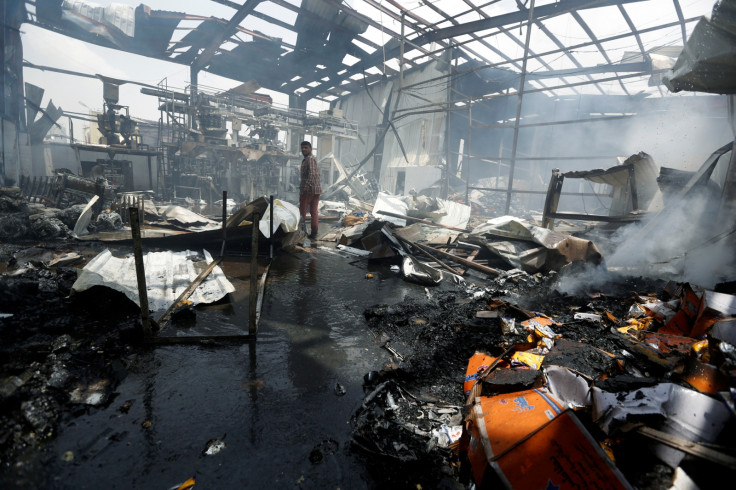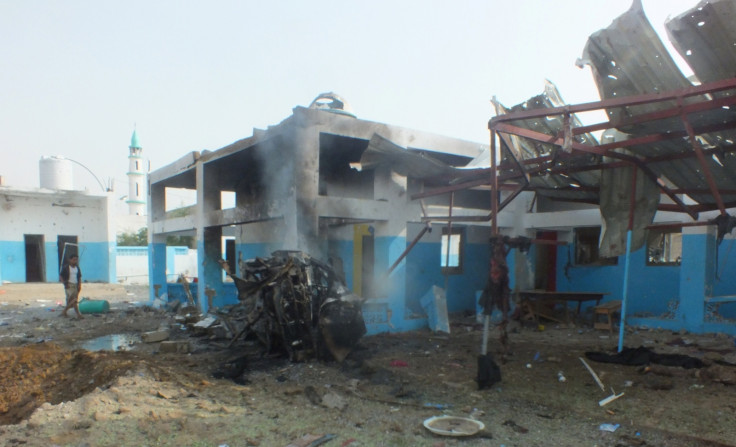While we bask in Olympic glory, Saudi Arabia is destroying Yemen with British bombs
The UN has accused Saudi forces of killing twice as many civilians as all others combined.

For many in the UK, the first half of August has been dominated by good weather, well-earned holidays and cheering-on Olympic glory. However, for people in Yemen it is turning into one of the bloodiest and most destructive months since Saudi Arabian forces intervened in the devastating civil war 18 months ago.
In the last seven days alone, Saudi-led forces have been accused of bombing a food factory, killing 14 people; a school, killing 10, including children; and most recently a Médecins Sans Frontières hospital (the fourth since the bombing began), killing 11.
Not only has the death toll and impact on infrastructure been terrible, it has also sent a painful reminder to Yemeni people that almost nowhere is safe. There is no question that atrocities have been committed on all sides of the complicated conflict, although the UN has accused Saudi forces of killing twice as many civilians as all others combined.
The human cost has been absolutely horrific. The war has seen the displacement of 2.5 million. Of those that remain, millions have been left without access to clean water or electricity, and 80% have been left in need of aid.
The ultimate responsibility must lie with the Saudi authorities and those that have dropped the bombs, but they have been supported every step of the way by supportive and compliant governments from all over the world, none more than the UK.
Since the bombing began last March, the UK has licensed over £3billion worth of arms to the Saudi regime, including Typhoon fighter jets, Paveway IV bombs (which Human Rights Watch has linked to the destruction of civilian targets) and missiles.
Saudi abuses have been closely monitored by the United Nations. Earlier this year a UN expert panel accused Saudi forced of "widespread and systematic" attacks on civilian targets. Its leaked report documented 119 sorties relating to violations of international humanitarian law (IHL) and reported starvation being used as a war tactic.
Another report, produced earlier this month, followed-up specific allegations, again accusing the Saudi forces of deliberately bombing civilian targets. "It is almost certain that the civilian house was the deliberate target of the high explosive aircraft bombs," it said, while focusing on a particular case that killed four children. It concluded that the coalition had failed to take precautions and had "thus violated international humanitarian law."
Condemnation of the bombardment has come from across the political spectrum. The European Parliament, Save the Children, Amnesty International, Oxfam, the House of Commons' International Development Committee, the Labour Party, the Scottish National Party, the Liberal Democrats, as well as MPs from the Green Party, Plaid Cymru and the SDLP have all called for an end to the arms sales.
Even the Saudi Arabian government has accepted what it refers to as "shortcomings" with the campaign. One example it cited as a "mistake" was the bombing of a residential compound that killed 65 people. The "regrets" may feel cosmetic and insincere, but the fact that Saudi forces are even having to concede the point is a sign of how overwhelming the evidence has been.

Despite widespread condemnation and opposition, the UK government's response has been a pathetic mixture of denial, excuses and delays. It has refused to even back the growing calls for an independent investigation into the conduct of the war, insisting that it is "satisfied that export licences for Saudi Arabia are compliant with the UK's export licensing criteria."
Last month, in the final hours of the last day of parliament, the Foreign Office published written corrections that revealed many of its claims about the conduct of the war were false. Where the record had once said that "The MOD assessment is that the Saudi-led coalition is not targeting civilians" this was corrected to the far more equivocal "The MOD has not assessed that the Saudi-led coalition is targeting civilians."
Whatever the verdict it will raise serious questions about UK foreign policy and the influence of arms companies and the Saudi monarchy.
This subtle but important distinction was typical of a series of changes that shifted the burden of responsibility, lowered the burden of proof and suggested that UK policy was being directed by Saudi-assurances. At best it represented staggering incompetence on the part of government ministers, who were conceding that they had "misspoken" a number of times over a six-month period, and at worst it could be viewed as a cynically timed admission that ministers had distorted the truth.
The real truth may come out in court. At present, the legality of UK arms sales to Saudi Arabia are currently subject to a judicial review, following an application by Campaign Against Arms Trade.
The claim calls on the government to suspend all extant licences and stop issuing further arms export licences to Saudi Arabia for use in Yemen while it holds a full review into if the exports are compatible with UK and EU legislation. A three-day hearing will take place in front of two judges no later than 01 February 2017.
Whatever the verdict it will raise serious questions about UK foreign policy and the influence of arms companies and the Saudi monarchy.
But what does it say about the UK's role in promoting human rights abroad? If the bombing of schools, hospitals and vital infrastructure is not enough for the government to stop selling weapons then what would it take? Is there any low that it won't sink to in order to maintain arms sales and political support for one of the most brutal dictatorships in the world?
At the moment there is little respite for the people of Yemen, and little prospect for lasting peace. The new government in Whitehall could use its influence to try to change that, but it would take a far greater political will than what has been on display so far.
Andrew Smith is a spokesperson for Campaign Against Arms Trade (CAAT). You can follow CAAT on Twitter at @CAATuk.
© Copyright IBTimes 2025. All rights reserved.






















